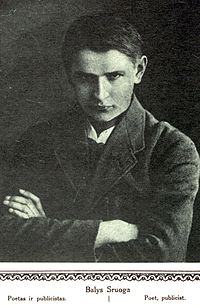Balys Sruoga | |
|---|---|
 Sruoga in the Lithuanian Album | |
| Born | Balys Sruoga 2 February 1896 Baibokai, Kovno Governorate, Russian Empire |
| Died | 16 October 1947 (aged 51) Vilnius, Lithuanian SSR, Soviet Union |
| Resting place | Rasos Cemetery |
| Occupation | Playwright, novelist, literary and theater critic |
| Nationality | Lithuanian |
| Alma mater | Ludwig Maximilian University of Munich |
| Genre | Symbolism |
| Notable works | Dievų miškas (Forest of the Gods) |
| Spouse | |
| Children | Dalia Sruogaitė |
| Relatives | Juozas Sruoga, Adolfas Sruoga, Kazys Sruoga |
Balys Sruoga (2 February 1896 – 16 October 1947) was a Lithuanian poet, playwright, critic, and literary theorist.
He contributed to cultural journals from his early youth. His works were published by the liberal wing of the Lithuanian cultural movement, and also in various Lithuanian newspapers and other outlets (such as Aušrinė, Rygos naujienos etc.). In 1914, he began studying literature in Saint Petersburg, and later in Moscow, due to World War I and the Russian Revolution. In 1921, he enrolled in the Ludwig Maximilian University of Munich, where in 1924 he received his Ph.D for a doctoral thesis on the relations between Lithuanian and Slavic folk songs. Sruoga was also the first translator of Anna Akhmatova's poetry, which he likely completed between November 1916 and early 1917.[1]
After returning to Lithuania, Sruoga taught at the University of Lithuania, and established a theater seminar that eventually became a course of study. He also wrote various articles on literature. From 1930 he began writing dramas. In 1939, he began teaching at Vilnius University. Shortly after the annexation of Lithuania by the Soviet Union, Sruoga relocated to Vilnius, where he continued lecturing on theater. However, during the Nazi occupation of the country, as an intellectual, Sruoga was arrested, imprisoned, and later deported to the Stutthof concentration camp. He wrote of his experience in the camp in the novel Forest of the Gods. After the camp was liberated by Soviet troops, the frail author died two years later in 1947.
- ^ Ivinskaja, Aliona Sofija (15 December 2019). "Балис Сруога – первый переводчик поэзии Анны Ахматовой" [Balis Sruoga - the first translator of Anna Akhmatova's poetry]. Literatūra (in Russian). 61 (2): 23–35. doi:10.15388/Litera.2019.2.2. Retrieved 29 June 2024.